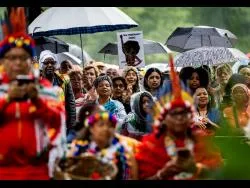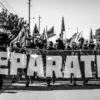
Located in the Leeward Islands, the island of St Martin comprises two individual countries: St Martin, colonised by France, and Sint Marteen, colonised by the Netherlands. The Netherlands recently issued two apologies on December 19, 2022, and July 1 for their part in the trans-Atlantic trafficking in enslaved Africans (TTA). However, in this apology, a very specific path to reparation was established, one that does not fully consider the needs of their current and former colonies. In this edition, we open the stage to hear the claim by the people of St Martin.
THE FACTS
The Netherlands engaged in enslavement, trafficking, and the financing of the TTA. These enslaved Africans were the ancestors of many of St Martin’s people. The people demand reparatory justice for the damage committed against them and their ancestors.
In 2001, Europe acknowledged colonialism as a crime against humanity, yet in 2023, the Netherlands continues to commit this crime against the St Martin people. In 2010, after centuries in the colonial enterprise called the Kingdom of the Netherlands and the scrutiny of the international community, the system was adjusted, creating “autonomous” territories via constellations. Still, the Dutch prime minister has stated that the Netherlands would not be engaging in reparations discussions.
The Netherlands created the legal, financial, and fiscal policies for the enslavement and trafficking of Africans and the continuation of colonialism in St Martin. Although the Netherlands issued formal apologies for its criminal activities of the past, there remains outstanding an unequivocal commitment to discontinuation of colonialism and disbursement of reparations, defined by the United Nations as restitution, rehabilitation, compensation, satisfaction, and guarantees of non-repetition.
THE CLAIM
In 1863, the Netherlands refused compensation for formerly enslaved People on St Martin at the time of Emancipation but paid reparations to enslavers for their “loss of property”. Furthermore, colonialism is a legacy of the Netherlands’ presence in St Martin and a continuation of discrimination rooted in TTA. It is evident that the TTA and colonialism is the cause of underdevelopment in St Martin. The terms sited in the two apologies made by the Netherlands were not satisfactory. A commitment to reparations by the Netherlands must also entail a commitment to decolonisation of the Caribbean region and transitioning of St Martin to a self-sustaining, sovereign state by July 1, 2030.
Recognising that the Netherlands cannot render restitution of the situation resulting from TCS and colonialism, One SXM demands that the Netherlands pay reparations in the form of rehabilitation, compensation, satisfaction, and guarantees of non-repetition. Using the United Nations definition of reparations and CARICOM’s 10-point plan as a framework, we demand the following from the Netherlands. The period leading to July 1, 2030 in this list is designated as the Transition.
One St Martin demands that the Netherlands:
1. Full formal apology: Complete the formal apology by unambiguously committing to reparations with guarantees of non-repetition and a commitment to cooperating with St Martin’s transition to a self-reliant and sustainable sovereign society.
2. Repatriation: Recognise and support the rights of St Martin people to return to their ancestral homeland and commit to the establishment of a repatriation and integration programme in the Transition. Artefacts taken from St Martin by the Dutch must be returned.
3. Indigenous peoples development programme: Commit to an Indigenous Peoples fund for research, rehabilitation, and preservation of the Indigenous Peoples’ heritage on the island.
4. Cultural institutions: Commit to a cultural heritage fund for the construction and sustained funding of museums, cultural and research centres, and national archives for the enlightenment and empowerment of the people of St Martin.
5. Public health and social security: Commit to a national health and social security service fund to facilitate the transition of the current healthcare system to one that provides free medical coverage for all.
6. Illiteracy eradication: Commit to an illiteracy eradication fund to restructure the current education system and create one centred on St Martin people’s cultural identity.
7. Higher education: Commit to a modern, state-of-the art, public national university of St Martin to provide world-class tertiary education. As well as a national scholarship fund to provide scholarships to St Martin students wishing to study at global institutions.
8. Salt and Agriculture: Compensate the people for the labour and removal of salt from St Martin by and for the Netherlands without compensation for cultural patrimony. Further, an agricultural fund must be established to enable the people to build self-sustaining infrastructure and programmes.
9. African knowledge programme: Commit an African studies fund to restore the knowledge lost by the St Martin people of African descent due to their forced extraction from their ancestral homeland, resulting in cultural alienation.
10. Transfer of Technology: The funding of a knowledge commission fund at the national university of St Martin to research the global trends in research, science, and technology, ensuring that they regularly get incorporated into the regular knowledge and skills development programmes at the university and other educational institutions.
11. Rehabilitation and compensation for psychological trauma: Commit to a psychological rehabilitation fund that would treat the rehabilitation of the people from the inter-generational psychological trauma inflicted upon them because of TTA, continued colonialism by the Netherlands, and structural racism that persist in the nature of the relationship and representation in the kingdom.
12. Bestowing justice: Commit to a people justice fund to overhaul and transition the current justice system to one centred on the St Martin people’s cultural values and language.
13. International financial system accessibility: Commit to a national bank fund to facilitate the transition of the current banking system to one that is self-sustaining and to the removal of systemic barriers that limit the access of the economy of St Martin to the international market.
14. Climate justice: Commit to a climate justice fund that will serve to rehabilitate the St Martin people from the harmful climate conditions resulting from TTA, chattel slavery and colonialism, and render justice in the forms of risk reduction and adaptation to climate change.
15. Debt cancellation: Commit to the cancellation, with immediate effect of all “debts” to and “loans” by the Netherlands placed on the current and future generation of the St Martin people. This includes the return of any amounts already paid in full, any portion of loans already paid, and the interest paid on such loans.
The Brattle Report lays out the legal obligation for reparations and quantifies the debt the Netherlands has to Guyana and Suriname. While the exact figures for St Martin are yet to be determined based on further research, and cognisant that the cost of the claim here will not add up to what will be established once the research is complete, One St Martin is demanding that the Netherlands be held to account and commit to pay reparations to the St Martin people in the Transition and the balance of reparations payments be held over in an independence fund in 2030.
Contributed by One St Martin (One SXM). Send feedback to reparation.research@uwimona.edu.jm.


